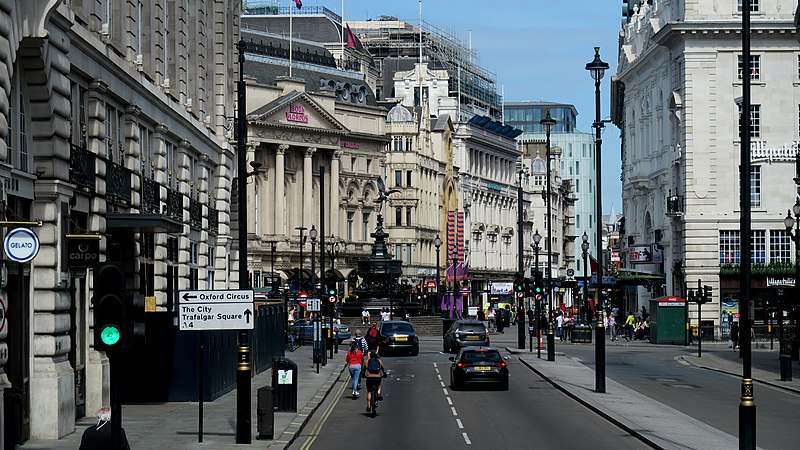The UK has reported a surprising drop in COVID cases despite the recent easing of restrictions, from 50,000 a day in mid-July to 20,000 by early August.
In a development that has surprised many health experts, the number of positive COVID cases recorded in the United Kingdom has significantly dropped since the easing of domestic coronavirus restrictions in mid-July.
Although it was expected that that daily positive cases could rise to as many as 100, 000 after the UK celebrated “freedom day” on July 19th, due to increased social contact and the spread of the dangerous Delta variant, this concern has seemingly proved unfounded. Instead, cases had significantly dropped from 50,000 a day in mid-July to 20,000 by early August.
One of the primarily reasons that the UK has managed to keep its COVID cases relatively low is the British government’s continuous monitoring of the spread of coronavirus in other countries. Entry restrictions for foreign citizens are designated as either ‘green’, ‘amber’ or ‘red’ depending on the risk posed by a country at any given time, and these lists are reviewed every 3 weeks as the ongoing situation develops.
Nevertheless, the UK is gradually relaxing its entry restrictions for vaccinated travelers and opening up to previously banned territories. Several Middle Eastern countries that were on the UK’s ‘red list’ and subject to the strictest entry restrictions have now been redesignated
as ‘amber’, including Bahrain, Qatar, and the United Arab Emirates.
For example, those planning to travel to the UK from Kuwait no longer need to quarantine at home or in the place they are staying in England for 10 days if they have been fully vaccinated or take a test on day 8 of the self-isolation. They simply need to take a COVID-19 test in the 3 days before traveling, complete a passenger locator form, and book and pay for an additional test to be taken on the 2nd day after arrival.
However, a large list of countries, particularly those most affected by the spread of the Delta variant, remain on the red list. Travelers who have been in any of these territories within the previous 10 days are not allowed to enter the UK under any circumstances, unless they are a British or Irish National, or have residence rights.
Additionally, it remains necessary to have a quarantine hotel booking for all travelers arriving by air in Scotland, no matter where they are traveling from.
H2 – Social contact in the UK has generally deceased, not increased
Although domestic travel in the UK is now more open than it ever has been since the pandemic began, and citizens can mix more freely, the average number of people an individual comes into contact with on a daily basis has surprisingly gone down. Before “freedom day”, the average UK citizen came into close contact with roughly 3.7 others daily, according to a survey conducted on over 5,000 people by the London School of Hygiene and Tropical Medicine.
However, this figure had fallen to 3.1 contacts a day by the week ending August 2nd, showing a remarkable level of restraint from the British public. This drop was largely attributed to the start of the school holidays in the UK, while, despite a spike during the Euro 2020 soccer tournament, close contact between adults has significantly decreased as well.
H2 – Experts warn that UK COVID cases could still spike in coming weeks
Nevertheless, some health experts have warned that the spike during the Euro soccer tournament may not be a one-off, and may be indicative of a big rise in cases to come if levels of social mixing reach pre-pandemic levels.
“When schools reopen and people return to offices, we could see a quite major epidemic of cases and infections from September onwards”, said John Edmunds, a professor of infectious disease modeling at the London School of Hygiene and Tropical Medicine. He noted that it took at least a month before social mixing saw a large increase after the government relaxed restrictions in the summer of 2020.
Devi Sridhar, professor of global public health at the University of Edinburgh, has warned that the biggest risk factors could be “a large population of unvaccinated children mixing” once schools reopen. This could lead to a new wave of infections among adults, even if they have already been vaccinated.
Professor Robert West, a University College London psychologist and member of the government’s Scientific Pandemic Influenza Group on Behavior, has said that another big worry is that citizens would “throw caution to the wind as the visible signs of the pandemic fade away”. To combat this, he has argued that the government must continue to emphasize the dangers of COVID-19 and warn people not to fall back into pre-pandemic habits quite yet.
Tatiana is the news coordinator for TravelDailyNews Media Network (traveldailynews.gr, traveldailynews.com and traveldailynews.asia). Her role includes monitoring the hundreds of news sources of TravelDailyNews Media Network and skimming the most important according to our strategy.
She holds a Bachelor's degree in Communication & Mass Media from Panteion University of Political & Social Studies of Athens and she has been editor and editor-in-chief in various economic magazines and newspapers.






























































































































































































